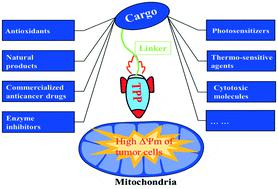当前位置:
X-MOL 学术
›
RSC Med. Chem.
›
论文详情
Our official English website, www.x-mol.net, welcomes your
feedback! (Note: you will need to create a separate account there.)
TPP-based mitocans: a potent strategy for anticancer drug design
RSC Medicinal Chemistry ( IF 4.1 ) Pub Date : 2020-06-03 , DOI: 10.1039/c9md00572b Jiayao Wang 1 , Jiaqi Li 1 , Yumei Xiao 1 , Bin Fu 1 , Zhaohai Qin 1
RSC Medicinal Chemistry ( IF 4.1 ) Pub Date : 2020-06-03 , DOI: 10.1039/c9md00572b Jiayao Wang 1 , Jiaqi Li 1 , Yumei Xiao 1 , Bin Fu 1 , Zhaohai Qin 1
Affiliation

|
Cancer is one of the most important problems that endanger human health. The number of cancer patients is increasing rapidly worldwide. Compared with normal cells, cancer cells exhibit abnormal metabolism (abnormal glycolysis and oxidative phosphorylation, high levels of reactive oxygen species, anti-apoptosis, high mitochondrial membrane potential, and so on), and specific targeting of these metabolic abnormalities would be a promising drug design direction. These physiological characteristics are closely related to tumorigenesis and development, which are mainly regulated by mitochondria. Therefore, mitochondria have become important anticancer drug targets, attracting much attention in recent years. In this review, we systematically summarize various mitochondrial anticancer drugs developed, especially mitocans based on triphenylphosphonium (TPP), and discuss the advantages of TPP in endowing mitochondrial targeting function.
中文翻译:

基于 TPP 的线粒体:抗癌药物设计的有效策略
癌症是危害人类健康的最重要问题之一。全球癌症患者数量正在迅速增加。与正常细胞相比,癌细胞表现出代谢异常(糖酵解和氧化磷酸化异常、活性氧水平高、抗凋亡、线粒体膜电位高等),特异性针对这些代谢异常将是一种有前途的药物设计方向。这些生理特征与肿瘤的发生、发展密切相关,主要受线粒体的调控。因此,线粒体已成为重要的抗癌药物靶点,近年来备受关注。在本文中,我们系统总结了各种已开发的线粒体抗癌药物,特别是基于三苯基膦(TPP)的线粒体抗癌药物,并讨论了TPP在赋予线粒体靶向功能方面的优势。
更新日期:2020-06-03
中文翻译:

基于 TPP 的线粒体:抗癌药物设计的有效策略
癌症是危害人类健康的最重要问题之一。全球癌症患者数量正在迅速增加。与正常细胞相比,癌细胞表现出代谢异常(糖酵解和氧化磷酸化异常、活性氧水平高、抗凋亡、线粒体膜电位高等),特异性针对这些代谢异常将是一种有前途的药物设计方向。这些生理特征与肿瘤的发生、发展密切相关,主要受线粒体的调控。因此,线粒体已成为重要的抗癌药物靶点,近年来备受关注。在本文中,我们系统总结了各种已开发的线粒体抗癌药物,特别是基于三苯基膦(TPP)的线粒体抗癌药物,并讨论了TPP在赋予线粒体靶向功能方面的优势。











































 京公网安备 11010802027423号
京公网安备 11010802027423号